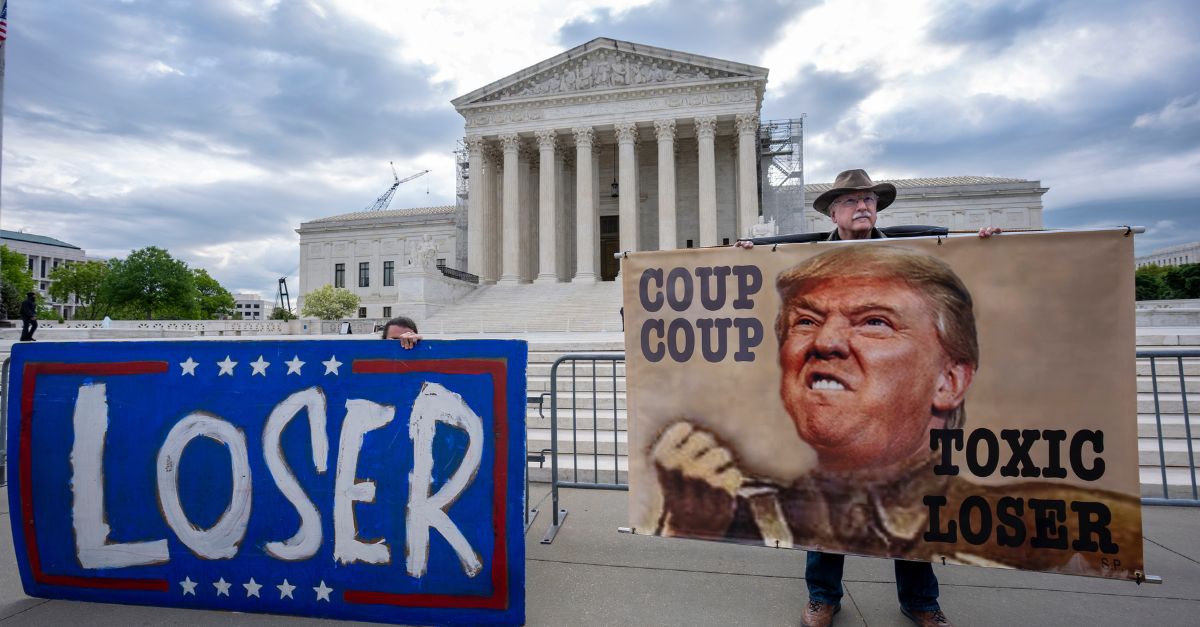

Activist Stephen Parlato of Boulder, Colo., right, joins other demonstrators outside the Supreme Court as the justices get ready to hear arguments over whether Donald Trump is immune from prosecution in a case alleging him of plotting to overturn the results of the 2020 presidential election, on Capitol Hill in Washington, Thursday, April 25, 2024. (AP Photo/J. Scott Applewhite)
As oral arguments at the Supreme Court on the issue of Donald Trump’s immunity from criminal prosecution began Thursday, Trump’s lawyer started by stating a president could assassinate a political rival if it could be seen as an “official act.”
“If the president decides that his rival is a corrupt person and he orders the military … to assassinate him, is that within his official acts for which he can get immunity?” Justice Sonia Sotomayor asked Trump attorney John Sauer.
Sauer, invoking an argument he made previously before Thursday replied: “It could well be an official act.”
When Sotomayor pressed him if it mattered if the former president was doing it for his “personal gain,” Sauer offered a condition.
“A president is entitled for total personal gain to use the trappings of his office … without facing criminal liability.”
The content of the alleged improper act isn’t what the liability hinges on anyway, according to Sauer.
At the start of arguments Thursday, the attorney said if a president can be charged, put on trial and imprisoned for his “most controversial decisions as soon as he leaves office, that looming threat will distort the presidency’s decision-making precisely when bold and fearless action is needed.”
Former presidents like George W. Bush and Barack Obama and current President Joe Biden could be prosecuted for their conduct while in office if the court rules against Trump here, Sauer argued.
Historically, Trump has argued that because Obama used drone strikes that killed American citizens abroad, he should have been prosecuted but was not. He has also pointed to former President George W. Bush and has said that he could be held to account for dragging the United States into war in Iraq.
Sotomayor told Sauer she was having a “hard time” with this line of reasoning and others.
“I’m having a hard time thinking that creating false documents, that submitting false documents, that ordering the assassination of a rival, that accepting a bribe and a countless other laws that could be broken for personal gain, that anyone would say it would be reasonable for a president, or any public official to do that,” she said.
Justice Elena Kagan also asked Trump’s lawyer, rather pointedly, how immunity might apply to a president who orders the military to “stage a coup.”
“There’s a whole series of guidelines against that,” Sauer said, noting that the U.S. military is already legally forbidden from following plainly unlawful acts.
If the president were to stage a coup with the military’s help, or attempt to, he could be impeached for it, the attorney conceded, but there may also be circumstances in which this could be deemed an “official act” of the presidency.
Kagan abruptly asked what it meant that the president, as commander in chief, had spoken to generals and expressed the desire to stay in power and stage a coup, and if it sounded bad.
Sauer argued that the Framers of the Constitution implemented checks to prevent such a scenario.
Kagan interrupted the attorney.
Kagan pointed out that the Framers did not include an immunity clause in the Constitution, although they had the knowledge to do so through state constitutions and legislative immunity.
Would it be surprising that the framers were responding to a Monarch who believed it was above the law?
Wasn’t the whole idea that the president is not a monarch and not above the law?
Sauer mentioned that the Constitution indirectly included it through the executive vesting clause.
When Justice Brett Kavanaugh supported Sauer’s claims, he emphasized that the president is subject to criminal liability for personal acts, like every other American, despite not being above the law or a king.
The question revolves around whether he can be prosecuted for 'official acts,' Kavanaugh explained.
Arguing for the government was Michael Dreeben, Justice Department counselor to special counsel Jack Smith.
Trump’s new theory of immunity would provide immunity for former presidents for a range of serious crimes, including treason, bribery, sedition, and murder.
Dreeben stated that Trump was conspiring to use fraud to overturn election results and perpetuate himself in power.
This kind of immunity has no basis in the Constitution, which instead has a balanced framework that protects the president without giving blanket immunity.
In response to Trump’s argument about criminal liability affecting presidents' ability to make policy decisions, Dreeben noted that the Office of Legal Counsel has addressed this with a 'public authority exception.'
Dreeben noted that this exception has been incorporated into federal law unless Congress takes action to override it, which it has not done.
Dreeben discussed a case where the Office of Legal Counsel explained why a public authority defense would prevent overseas activity from being considered a violation of the law.
Justice Clarence Thomas made a curious comparison when Dreeben was speaking.
Thomas referred to past presidents engaging in coups and questioned why there were no prosecutions, implying that there should have been criminal prosecution if the argument presented was correct. Operation Mongoose was mentioned in this context.
Operation Mongoose is not exactly the same, though. It aimed to oust Fidel Castro from power in Cuba. The allegations against Trump claim that he attempted to conspire against the overthrow of his own government.
“This is a crucial issue. The lack of previous criminal prosecutions is because there were no crimes,” Dreeben said.

